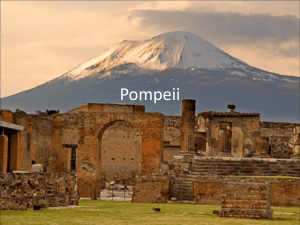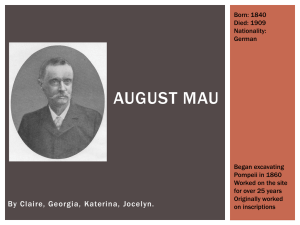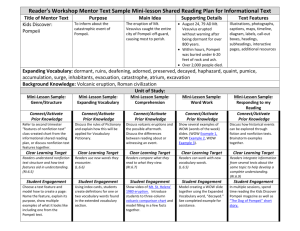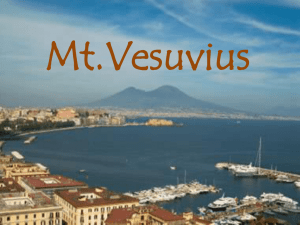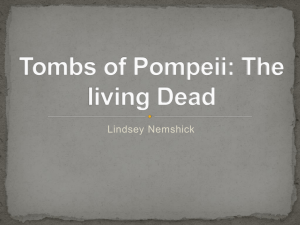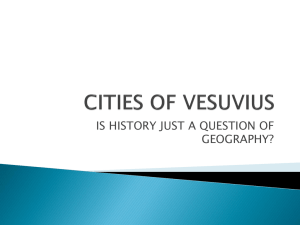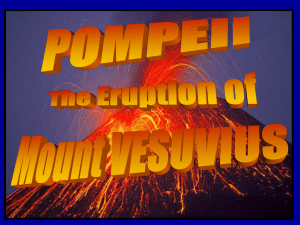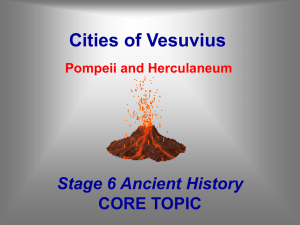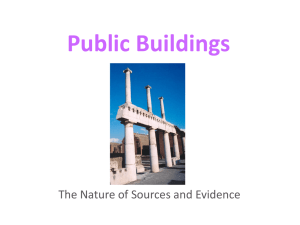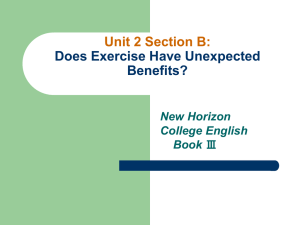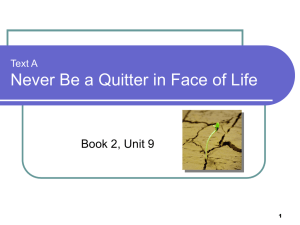Detailed Analysis
advertisement
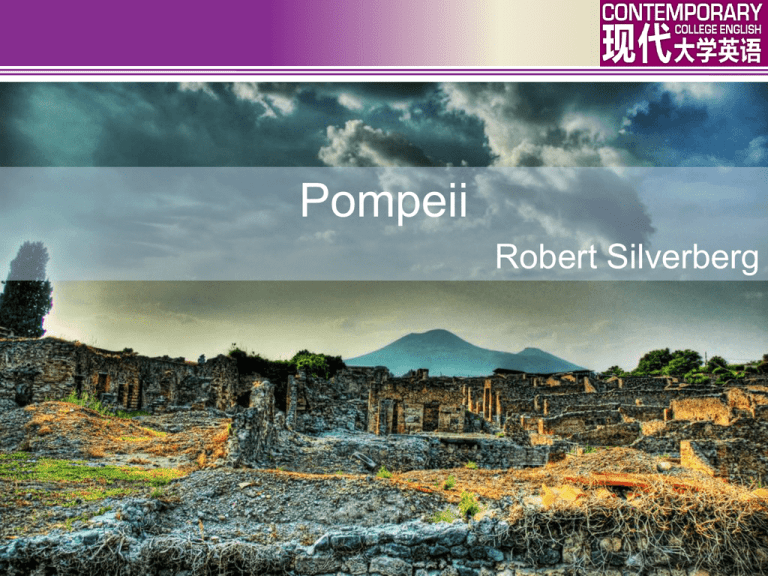
Pompeii Robert Silverberg Pompeii Unit 10 W arming up B ackground T ext Analysis R einforcement Pompeii Unit 10 Questions / Activities Check-on Preview Objectives Warming up Warming up • • • • Questions / Activities Why does the author call Pompeii a strange city? What happened to the city? What was the city like before it was destroyed? What are some other natural disasters in world history that you have learned about? Warming up Check-on Preview Match the words with their correct meaning in the text. 1. 2. 3. 4. 5. 6. hurl graze cram intact mighty shatter a. very strong or powerful b. to suddenly break into small pieces c. to throw violently in a particular direction e. to eat grass growing in a field f. to push sb./sth. into a small place g. complete and not damaged Warming up Objectives • Understand the structure and the general idea of the text • Know something about the history of Pompeii and what happened in AD 79 • Be able to use specific verbs to describe things • Be able to create a dominant impression by using words about five senses • Know something about natural disasters like volcanic eruptions, earthquakes, tornado etc. Pompeii Unit 10 Author Background Culture Tips His Life Background Author Robert Silverberg (born January 15, 1935) is an American author, best known for writing science fiction. In 1956 he graduated from Columbia University, having majored in Comparative Literature. Background Culture Tips • Naples is the capital of Campania and the third-largest city in Italy, after Rome and Milan. It has a population of nearly one million within its administrative limits on a land area of 117.3 km2 (45 sq mi). The urban area of Naples extends beyond the administrative city limits, with a population of above three million. Background Culture Tips • The city of Pompeii is a partially buried Roman town-city near modern Naples. Pompeii was partially destroyed and buried under 4 to 6 m (13 to 20 ft) of ash and pumice in the eruption of Mount Vesuvius in AD 79, and it was lost for nearly 1700 years before its accidental rediscovery in 1749. Since then, its excavation has provided an extraordinarily detailed insight into the life of a city during the Pax Romana. Today, this UNESCO World Heritage Site is one of the most popular tourist attractions of Italy, with approximately 2,500,000 visitors every year. Background Culture Tips Pompeii the Last Day • A multidisciplinary study of the eruption products and victims indicates that at Vesuvius and surrounding towns, heat was the main cause of death of people, previously believed to have died from ash suffocation. The results of the study, published in 2010, show that exposure to at least 250 °C hot surges at a distance of 10 kilometers from the vent was sufficient to cause instant death, even if people were sheltered within buildings. Background Culture Tips • Mount Vesuvius is best known for its eruption in AD 79 that led to the burying and destruction of the Roman cities of Pompeii and Herculaneum. They were never rebuilt, although surviving townspeople and probably looters did undertake extensive salvage work after the destructions. The towns' Pompeii, with Vesuvius towering above locations were eventually forgotten until their accidental rediscovery in the 18th century. Mount Vesuvius Background Culture Tips Vesuvius from plane Inside the crater of Vesuvius Background Culture Tips Jupiter is the king of the gods and the god of sky and thunder. Jupiter was the chief deity of Roman state religion throughout the Republican and Imperial eras, until the Empire came under Christian rule. Jupiter is thought to have originated as a sky god. His identifying implement is the thunderbolt, and his primary sacred animal is the eagle, which held precedence over other birds in the taking of auspices and became one of the most common symbols of the Roman army. Background Culture Tips Apollo is one of the most important and complex Olympian deities in ancient Greek and Roman religion, Greek and Roman mythology. Apollo has been variously recognized as a god of light and the Sun, truth and prophecy, healing, plague, music, poetry, and more. Apollo is the son of Zeus and Leto, and has a twin sister, the chaste huntress Artemis. Background Culture Tips • Isis is a goddess in Ancient Egyptian religious beliefs. She was worshipped as the ideal mother and wife as well as the patron of nature and magic. She was the friend of slaves, sinners, artisans, and the downtrodden, and she listened to the prayers of the wealthy, maidens, aristocrats, and rulers. Isis is also known as protector of the dead and goddess of children. • The name Isis means "Throne". Her headdress is a throne. As the personification of the throne, she was an important representation of the pharaoh's power. The pharaoh was depicted as her child, who sat on the throne she provided. Pompeii Unit 10 Text Analysis Structure Detailed Analysis Text Analysis Structure Part I: Para. 1-7 • A brief account of Pompeii before and after August 24, AD79. Part II: Para. 8-9 • A detailed description of what happened on the day of the eruption. Text Analysis Detailed Analysis Part I: Main Idea • What was the city like before the eruption? • What were people in Pompeii doing before the eruption? • If the city had not been destroyed by the volcanic eruption, what would it be like today? Text Analysis Detailed Analysis Part I: Words & Expressions Words erupt; strike; perish; shroud; intact; clatter; shimmer Phrases Phrases no other; come down; hide from; break through; be in place; come to life; be in port; clear away Sentence Pattern the day + that clause; to do …is to do.; …is all one needs to do. Grammar inversion Words Text Analysis Detailed Analysis strike (para. 4) to cause a person or place to suffer severely from the effects of something very unpleasant that happens suddenly e.g. 1. I've got a life insurance policy that will look after my family if disaster strikes. 2. The disease has struck the whole community, sometimes wiping out whole families. 3. They predict that a large earthquake will strike the east coast before the end of the decade. Text Analysis Detailed Analysis perish (para. 4) to die, especially in an accident or by being killed, or to be destroyed e.g. 1. Three hundred people perished in the earthquake. 2. He believes that Europe must create closer ties or it will perish. 3. "Publish or perish" is a phrase coined to describe the pressure in academia to rapidly and continuously publish academic work to sustain or further one's career. Text Analysis Detailed Analysis a rain of sth.(para. 4) a rain of sth.: a large number of things that fall from the sky at the same time. e.g. A rain of abuse has been heaped upon him. 他遭到好一顿咒骂。 这类用法属于暗喻(metaphor),相似例子如下: A storm of applause rose from the audience. 观众一 阵喝彩。 The charges touched off a storm of protest. 那些指控激起了猛 烈的抗议。 Text Analysis Detailed Analysis shroud (para.5) a layer of something which covers or surrounds something e.g. 1. Everything was covered in a thick shroud of dust. 2. The truth about the accident remains hidden beneath a shroud of secrecy. Text Analysis Detailed Analysis shimmer (para.6) to shine in such a way that the light seems to shake slightly and quickly e.g. 1. She could see her reflection in the water, shimmering in the moonlight. Compare shimmer with other verbs like sparkle, twinkle and glisten. Text Analysis Detailed Analysis restore sth. to sth. (para.7) 1. The stolen goods were all restored to their owners. 被偷窃的东西都归还给原主了。 2. The house has been restored to its original splendor. 这座房子已经恢复了当初的光彩。 3. The city was finally restored to tranquility. 这座城市最后终于恢复了平静。 4. After years of neglecting, the palace has been restored to its former glory. 经过若干年的沉寂,这座宫殿恢复了以往的壮丽。 Text Analysis Detailed Analysis Part I: Sentence Paraphrase Beneath the protecting shroud of ash, the city lay intact. (para 5.) Paragraphing: The city remained as it had been before the eruption. It had been protected by the thick layer of ash that buried the city deep. Text Analysis Detailed Analysis Part I: Sentence Paraphrase A good imagination is all you need to restore it to activity. (para. 7) Paraphrasing: If you have a good imagination you will be able to imagine what was going on - the sights, sounds, smells and activities of a busy, prosperous Roman town. Text Analysis Detailed Analysis Part I: Exercises Translate the following sentences into English. 1.我的学校里没有别的美国人了。 There are no other Americans in my school. 2.他们最近已经从伦敦搬到乡村来住。 They've recently come down from London to live in the village. 3.你是不是有什么事要瞒着我? Are you trying to hide something from me? Text Analysis Detailed Analysis 4.不久,绿色的嫩芽就会破土而出。 Soon, tiny green shoots will break through the soil's surface. 5.书都放得整整齐齐,井井有条。 The books were all neatly in place, carefully arranged. 6.一个年轻女孩翻阅着家庭相册,童年记忆重回眼前。 A young girl's childhood memories come to life as she thumbs through her family photograph album. 7.我们的工作是清除这些垃圾。 Our job is to clear away the rubbish. Text Analysis Detailed Analysis Part II: Main Idea • What did people do after eruption? • What caused the greatest loss of life? • Did anyone survive the volcanic eruption? How did they manage to do it? • What would you do if you had been there in Pompeii? Text Analysis Detailed Analysis Part II: Words & Expressions Words vine-covered; summit; reverberate; pumice; overwhelm; cluster Phrases Phrases break loose; blow up; branch out; die away; go by; be at hand; make one’s way; be in store; lose consciousness; shower of stones Words Sentence Pattern Grammar past participle as attributive Text Analysis Detailed Analysis summit (para. 9) other popular usages of summit: 1. an important formal meeting between leaders of governments from two or more countries • a summit meeting • World leaders will meet next week for their annual economic summit. 2. the highest, most successful or most important point in something • I certainly haven't reached the summit of my career. Text Analysis Detailed Analysis reverberate(para. 13) LITERARY If a loud deep sound reverberates, it continues to be heard around an area, so that the area seems to shake • The narrow street reverberated with/to the sound of the workmen's drills. Text Analysis Detailed Analysis overwhelm (para. 18) 1. The village was overwhelmed by ash from the volcano. 村子被火山灰覆盖。 2. When he saw the dressmaker‘s daughter, he was overwhelmed by her beauty. 当他见到了裁缝师的女儿,马上为她的美貌倾倒。 3. I was overwhelmed by the sight of the tomb. 我为这陵墓的景象所慑服。 4. If one was overwhelmed by passion, it could lead to serious blunders. 当人的感情完全淹没理智时,就可能铸成大错。 Text Analysis Detailed Analysis cluster (para. 19) a group of similar things that are close together, sometimes surrounding something e.g. 1. Have a look at the cluster of galaxies in this photograph. 2. There was a cluster of fans around him, asking for autographs. Text Analysis Detailed Analysis Part II: Sentence Paraphrase The sound of the explosion died away, but it still reverberated in everyone’s ears. (para. 13) Paragraphing: Even when the loud sound stopped, people did not recover from the shock. Text Analysis Detailed Analysis Part II: Sentence Paraphrase An hour went by and darkness still shrouded everything. (para. 14) Paragraphing: An hour passed, things did not improve and darkness covered everything. Text Analysis Detailed Analysis Part II: Sentence Paraphrase Rushing throngs, blinded by the darkness and the smoke, rushed up one street and down the next, trampling the fallen in a crazy fruitless dash toward safety. (para. 17) Paragraphing: People panicked. They rushed into the streets to escape the falling buildings. It was dark and the air was full of smoke so they could not see where they are going. They rushed up one street and down the next in a hopeless attempt to reach safety. In their blind rush they ran over the bodies of people who had fallen down. Text Analysis Detailed Analysis Part II: Exercises Translate the following sentences into English. 1.一股巨大的力量即将迸发而出。 A mighty force was about to break loose. 2.他只得把火吹旺使它烧起来。 He had to blow up the fire to make it burn. 3.公司的业务从汽车零售扩大到汽车出租。 From car retail the company branch out into car leasing. 4.台风过后,风渐渐平息了。 The winds died away after the typhoon had passed. 5.胜利即将到来。 Victory is at hand. Text Analysis Detailed Analysis Part II: Exercises 6.随着时光流逝,多少人来了又走,留下无尽故事。 As time goes by, numerous people come and go, with countless stories left here. 7.我们设法从购物的人潮中挤过去。 We tried to make our way through the crowds of shoppers. 8.一场新的灾难即将向庞培袭来。 A new trouble was in store for Pompeii. 9.虽然我没有失去知觉,但那剧烈的疼痛确实难忍。 Though I did not lose my consciousness, the sharp pain was really killing me. Pompeii Unit 10 Discussion Reinforcement Retelling Reinforcement Retelling • Suppose you survived the volcanic eruption, retell how you managed to escape to your partner. • Suppose you are a visitor in Pompeii, retell what you have seen to your partner. • In both retellings, please use as many specific words as you can to make your account vivid. Reinforcement Discussion • What makes ruins like Pompeii well-known? • Ruins of quake-hit Sichuan now become new tourist hotspots. Is it suitable to develop “disaster tourism”? • What insights about life do tourist expect to gain?
